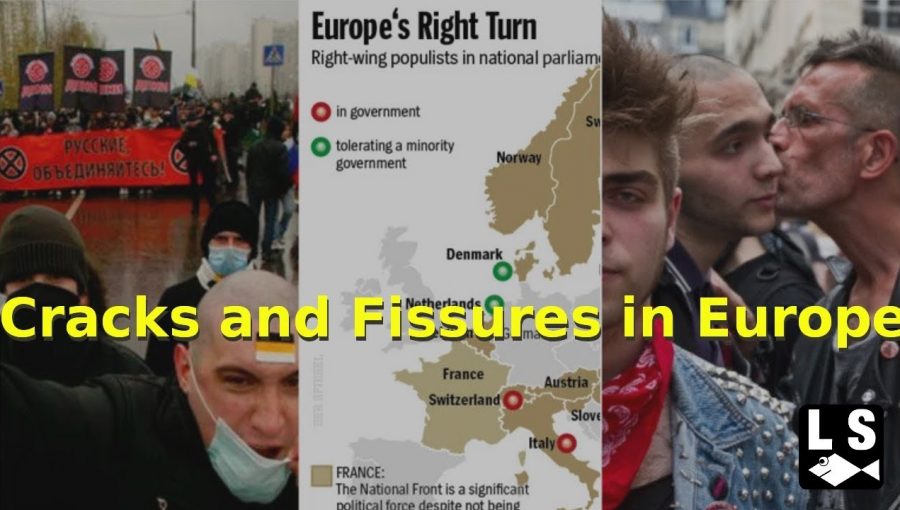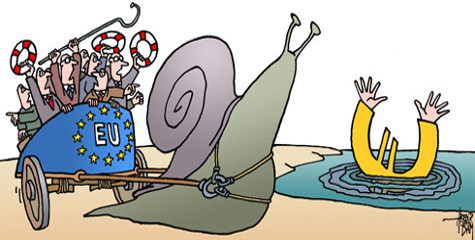On the Need for an Anti-Euro and Anti-EU Position
What has been happening in Greece, since the beginning of the austerity packages in 2010 can only be described in terms of a giant experiment in neoliberal social engineering. In terms of magnitude and scope it well surpasses the effects of the notorious IMF ‘structural adjustment programs,’ especially if we take into consideration that all these take place within the context of a European liberal democracy and not some Latin American military dictatorship of the 1970s. One might say that it is the European Union’s attempt to prove that it can be more efficient in implementing violent austerity programmes than the IMF.

Erosion of Sovereignty – Enter the Troika
The Greek experiment has also been an exercise in the erosion of popular sovereignty. In all aspects Greece is a country of reduced sovereignty. The representatives of the so called ‘Troika’ (European Commission (EU), European Central Bank (ECB) and the International Monetary Fund (IMF)) actually dictate measures in the name of ‘market liberalization’ and ‘competitiveness’ and no legislative initiative of the Greek government can be initiated without the explicit approval of the Troika representatives. The execution of the Greek budget and the tax collection process are closely monitored by the Troika officials. Without Troika approval Greece cannot receive the next part of the loans agreed with its creditors, thus the Troika actually controls the financial lifeline of a country.
However, this is not an exceptional case. Greece represents the extreme social violence but also the deep crisis of the European Integration Process and in particular the crisis of the Eurozone. Austerity in all its forms is the main item in the political agenda in most European countries. The millions that marched in Spain ‘for dignity’ were struggling exactly against the austerity policies imposed as part of the provisions of the European treaties and in exchange for European Stability Mechanism (ESM) and European Financial Stability Facility (EFSF) bailouts. Portugal has suffered enormously under the EU-imposed programs and the cost of the Irish crisis has also been enormous. In Italy, ever since the Mario Monti government (2011-2013), austerity packages have been imposed as part of an attempt to remain within European Union norms. Part of the anger and discontent expressed in the French municipal elections is exactly the result of austerity packages designed to keep France at the core of the Eurozone and of a growing disillusionment with the ‘European Project.’
Moreover, such measures will soon be the rule all over Europe. The current proposals of a ‘European economic governance,’ the fact that there are already in place restrictions (and penalty mechanisms) regarding budget deficits (through the terms of the ‘Treaty on Stability, Coordination and Governance’), and the plans for a Banking Union that would eliminate all forms of national control upon the banking system, all these attest to the undemocratic character of the European project. In reality a hybrid between intergovernmental coordination and co-federalism, it is nevertheless based upon an undemocratic conception of a ‘constitutionalism’ without democratic legitimacy. This is in favour of the forces of capital all over Europe, since it offers the promise of getting rid of whatever gains the labour movement still had and at the same time of guarantying the prerogatives of multinational capital. Moreover, the complex institutional architecture of the European Union means that apart from forms of ‘deliberation’ without much weight, the decision process is tightly insulated against any intervention from social movements and the demands of the subaltern classes.
Today, it is impossible for anyone to claim that criticism of the euro, and the entire financial, monetary, and political architecture of the euro-zone, is unjustified. On the contrary, we can say that the euro represents neither prosperity nor stability. On the one hand, the introduction of the euro, as a single currency, creates something similar to Max Weber’s ‘iron cage’ of capitalist modernization. The governments, even of less competitive national economies, decided to surrender their monetary sovereignty, in order to take advantage of the constant competitive pressure for restructuring and neoliberal reforms. On the other hand, the euro created the conditions for a new form of imperialist hegemony within Europe. The single currency was an advantage for the leading economies of Europe, and in particular Germany, since it offered not only currency stability and a broad space for exports and investment, but also the extra advantage of a constant competitive devaluation against less competitive peripheral economies.
In this sense, we can say that the imbalances of the euro as a single currency are structural and inherent to the project from the beginning. During periods of relative stability, these imbalances could be tolerated, especially since even peripheral elites could profit from cheaper credit and imports fuelling debt-driven consumerism and real estate bubbles. But during a period of crisis and recession these imbalances could become destabilizing, especially since less competitive economies were lacking crucial economic policy tools, because of the strict terms imposed upon them by the European treaties. In this sense the Greek crisis or the crisis in other countries of the European South is not a simple manifestation of the global economic crisis, nor the product of national particularities (exemplified in the almost racist stereotypes regarding ‘lazy’ Greeks or Spaniards); it is also, the direct result of the crisis of the Eurozone.
EU: Authoritarian, Racist and Imperialist
Despite the continuous efforts by EU propagandists to present it as a paragon of democracy and human rights, in reality the EU is becoming increasingly authoritarian, racist and imperialist. Apart from the constant erosion of popular sovereignty already discussed, we have the institutionalized racism of European anti-immigration policies. The official policy of ‘discouraging’ immigrants from arriving to Europe, is in reality a policy that in a conscious and planned manner leads to the repetition of tragedies such as the one at Lampedusa, at Farmakonisi etc.
At the same time, the ‘foreign policy’ of the European Union also represents the openly imperialist character of the ‘European Project.’ For the full support to the aggression against Yugoslavia to the current plans for military interventions in Central Africa and the open support for reactionary and fascist elements in Ukraine, the European Union never stood for peace or the rights of people.
In light of the above, it is obvious that we need to get out of the vicious circle of austerity, recession and unemployment. We need a program of radical – and at the same time urgent – measures to fight social devastation, a program that requires a strategy of an exit from the Eurozone and of a rupture with the European Union.
- The necessary immediate stoppage of debt payments and the annulment of debt implies a break with the European Union, which is now of the main creditors of Greece and the same goes with getting rid of the entire series of neoliberal laws dictated in the terms of the loan agreements.
- There can be no increase in public spending and no social protection against the systemic violence of international capital flows without an immediate exit from the Eurozone and regaining monetary sovereignty.
- Necessary immediate measures such as the nationalization and placement under democratic social control of the banking system and strategic enterprises, imply disobeying European treaties and regulations. Consequently, it is more than obvious that there can be no radical, progressive or socialist alternative within the economic and political constraints and limits imposed by the European Union.
Therefore a rupture with the monetary architecture of the Eurozone and with the institutional framework of the European Union in general, is also a necessary democratic step, an attempt
toward reclaiming popular sovereignty as a process of collective ‘social self-determination’ by a broad alliance of workers and other popular strata.
“…Think about a new socialist perspective, an alternative ‘social paradigm’ … forms of workers’ control, self-management, non-commercial distribution networks, and democratic planning, based upon the experience and collective ingenuity of people in struggle.”
At the same time such a process can open up the way to think about a new socialist perspective, an alternative ‘social paradigm’ in sharp contrast to the logic of the market and capital. This should be conceived in terms of an experimentation with forms of workers’ control, self-management, non-commercial distribution networks, and democratic planning, based upon the experience and collective ingenuity of people in struggle.
However, there are many on the Left that insist that ‘European Integration’ is an objective and irreversible historical process that offers no possible strategy for the Left other than trying to ‘change it from within’ through a change of balance of forces in favour of progressive politics.
This has been the main political line of the Party of the European Left and the parties associated with it or of theorists such as Toni Negri and Sandro Mezzandra who in a recent public intervention insisted on the process of European integration being ‘well beyond the threshold of irreversibility.’ One is tempted to compare this position to that of many socialists at the turn of the 20th century who insisted on the irreversible and even progressive character of colonial imperialism. It is obvious that what is missing here, is a serious discussion of both the actual economic, political and institutional configuration of the European Union, and in particular of the monetary and economic architecture of the Eurozone, and of the fact that we are dealing with class strategies and not ‘objective’ tendencies.
At the same time, there has been a great debate in the European Left regarding this strategy of an exit from the Eurozone and potentially the European Union. Many have accused this strategy of being ‘nationalist,’ ‘chauvinist,’ or as ‘aiming at increased economic competition.’ Nothing is further from the truth.
To take the Greek case as an example, such a strategy is not a strategy for increased competitiveness of the Greek economy through devaluation and increased exports. Necessary measures such as correcting the exchange rate are about protecting Greek society from the systemic violence inherent in international capital and commodity flows. It has nothing to do with a cycle of competitive devaluations against other countries of the European South. We know, from the experience of the Euro, but also from other systems of fixed exchange rates (such as dollar-pegging) that a single currency always leads to real wage reductions, austerity measures, privatizations and constant pressure for neoliberal reforms in the name of responding to competitive pressures. Exiting such monetary configurations is not a strategy for ‘isolation,’ but a necessary defence against aggressive capitalist policies. Moreover, it would a mistake to accept, in the name of ‘internationalism,’ the current form of capitalist internationalization of production, where a product has to travel around the world, go through ‘social dumping’ areas and ‘special economic zones’ and have a negative environmental impact, in order to arrive to our market place. Aren’t locality, environmental protection, relative self-sufficiency, crucial aspects of any potential anti-capitalist alternative?
The usual response to these questions from a large part of the European Left, both ‘reformist’ and ‘anticapitalist,’ has been that at the European level, through coordinated struggles, it is more easy to have successful struggles and victorious movements. However, the obvious question is: Why is it easier at the European level, with 28 different countries, with different traditions of left-wing and radical politics and different levels of organization of the workers’ movement, with different national economic and social conjunctures, than at the national level, where one can think of particular countries having such a condensation of contradictions and such a dynamic of social contestation, protest and mobilization that could turn them into potential ‘weak links in the chain’?
It would be wrong today to identify internationalism with offering our consent to an aggressive neoliberal and imperialist project. Moreover, we must never forget that European integration is a class strategy from the part of capitalist elites, thus there’s no point in fatalistic and deterministic references to its irreversible character. Especially, since such an insistence to the inevitability of European integration can lead to crucial shifts in political direction. It can easily lead to the shift from an initial stand of a ‘radical’ position in favour of the ‘dissolution of EU’ through pan-European anti-capitalist struggle to a more ‘realist’ position in favour of ‘another Europe’ and ‘another EU’ without neoliberalism and democratic deficit, with a ECB aiming at solidarity, with redistribution of funding etc. But this ‘good’ EU cannot exist. One should always remember the refutation of the ‘ontological argument’ regarding the existence of God: the fact that we can think about something or imagine it, does not mean it can actually exist.
Today one of the problems of the Left in Europe is exactly its obsessive Europeanism, its refusal to even think about a potential rupture with the ‘European integration’ process. One can witness this problem in the limits of SYRIZA’s strategy in Greece. Taking all the constraints imposed by the Eurozone and the EU as granted does not leave much space for radical politics, other that the demand for a renegotiation of the terms of the loan agreement toward some form of ‘austerity with a human face’ or the demand of a ‘Marshall Plan’ for Europe. In the past months we have seen SYRIZA moving constantly to the right, declaring that once in government they will repay the greater part of the debt after renegotiation and that they will remain within the euro at all costs (abandoning their official position of “no sacrifice for the euro”), trying to forge links with big banks and big business. It is more than obvious that such positions will not lead to the ‘renegotiation’ the SYRIZA leadership is hoping for, but to even more pressure on the part of the EU and the Troika for more austerity measures. The problem with the SYRIZA leadership is not that they are ‘left reformists’ in the sense
that they are not militant enough or in the sense that they opt for a gradualist approach. The problem is that they refuse the necessary political and social rupture with ‘European Union’ as the condensation of bourgeois strategy.

Such a refusal to articulate a political line against the European Union, leaves open a crucial space for the Far-Right to project her own reactionary version of ‘euroscepticism.’ Despite the growing resentment of great segments of European societies against the neoliberal, undemocratic and aggressive character of the European Union, despite the increased hostility against the euro as a single currency, despite the growing disbelief against the EU as such, most parties of the European Left make no particular effort to transform these feelings in a anti-EU, anticapitalist, progressive discourse. Consequently, a political void is created which the Far-Right is currently trying to fill. The necessary ‘Euroscepticism of the Left’ is not there, at the time when it is most urgently needed. In contrast, most parties of the European Party of the Left, but also many anticapitalist tendencies, refuse to take position upon such a crucial question. The French case exemplifies this problem: the refusal of the Left, especially on the part of the French Communist Party, to think in terms of a rupture with the euro and the EU, has made the Far-Right, reactionary (and pro-business) National Front to seem like the only euroscepticist political force.
Therefore it is urgent that we open up the debate within the European Left and the collective elaboration of a potential radical anti-euro and anti-EU alternative. Hopefully there are signs that segments of the Left are abandoning their obsessive Europeanism. In France both within the Front de Gauche (Left Front) and the NPA (New Anticapitalist Party) there are voices calling for a strategy of rupture with the European Union. In Greece, not only ANTARSYA, the Front of the Anticapitalist Left and other radical groups, but also the ‘Left Platform’ within SYRIZA have insisted upon a strategy for the Greek exit from the Eurozone and potentially the EU. In Cyprus, even AKEL is slowly changing its position after the disastrous experience of 2013. In Germany, there are many voices within Die Linke that criticize the single currency. In Britain, there are still many voices on the Left that insist on a anti-EU position.
However wrong it would be to consider the exit from the Eurozone and potentially the EU as a panacea for all social problems, it would be equally wrong to underestimate the importance of such questions. Anticapitalism can never be abstract. It should always be expressed and concretized in particular questions and challenges.
The Question of the Euro and the EU
Today, within the European Left, the question of the position vis-à-vis the Eurozone and the European Union draws a necessary
line of demarcation. Moreover, as the history of the workers’ movement shows, questions that have to do with the articulation between struggles at the national level and the configuration of the international system, always act like points of condensation of contradictions and like litmus tests for the ability of the Left to be really antagonistic to capitalist strategy.
At the same time, trying to envisage this kind of alternative, not only in terms of ‘catch-phrases’ about ‘workers’ power’ but
in terms of the articulation of a narrative that could be antagonistic to the dominant neoliberal discourse, requires exactly a confrontation with the problems and strategic aporias of most tendencies of the contemporary Left. It requires:
- The articulation of the program (and the basic lines of demarcation such as debt annulment, exit from the euro and the EU, nationalizations, redistribution of income,
implementation of forms of democratic social control etc) into concrete radical proposals that take into consideration the experience and knowledge coming from the movements. - The insistence on the escalation of struggles and a strategy of a ‘prolonged people’s war,’ because it is impossible to have any political change without a strong movement from below, without a broad social and political alliance that is confident about its ability to wage victorious struggles. In contrast, a sense of defeat or powerlessness among the workers and other popular strata can only lead to fragmentation and an individualized fight for survival, a tendency that will undermine left-wing politics!
- The confrontation with the open questions of revolutionary strategy and the need to elaborate on a strategy that could combine fighting government of the
Left, based on the necessary transition programme, with forms of self-organization, self-management, workers’ control and solidarity from below as the contemporary version of a ‘dual power’ strategy. - The experimentation with new forms of political organization, beyond both the model of the anticapitalist sect and the electoral front without programmatic elaboration and democratic process, toward a redefinition of political parties and fronts as laboratories of mass critical political intellectuality, as learning process, and sites able to actually produce alternative narratives for societies.
Because today, at least in the ‘weak links of the chain’ such as Greece, the challenge is not resistance but hegemony. Faced
with a severe crisis of hegemony, caused both by the crisis of neoliberalism and an impressive protest and contestation cycle of almost insurrectional character, a hegemonic crisis that cannot be disguised by the current cynical ultra-liberal ‘fuite en avant’ tactic adopted by European bourgeoisies, the challenge for the Left in each country is to attempt to forge a new historical bloc: the combination between a broad alliance of the subaltern classes, a radical program, and new forms of social and political organization. Refusing the ‘European Road’ and the ‘European Integration Project,’ namely the main strategic choice of European bourgeoisies since the end of WWII, is an indispensable aspect of any attempt toward a new socialist perspective for the 21st century. •
This text is based on a presentation at ANTARSYA UK meeting (March 29, 2014), and first published on his blog at lastingfuture.blogspot.gr.




